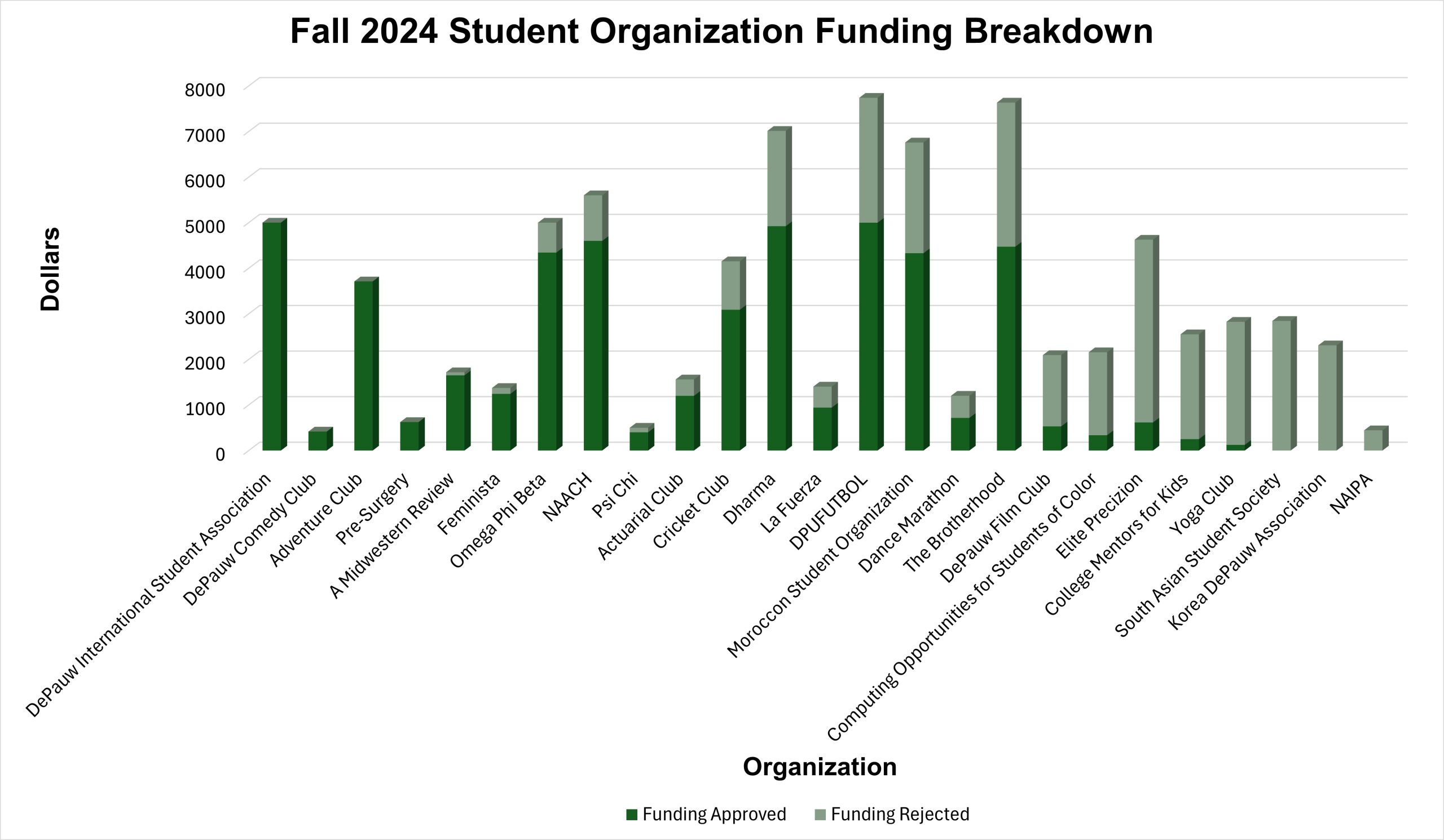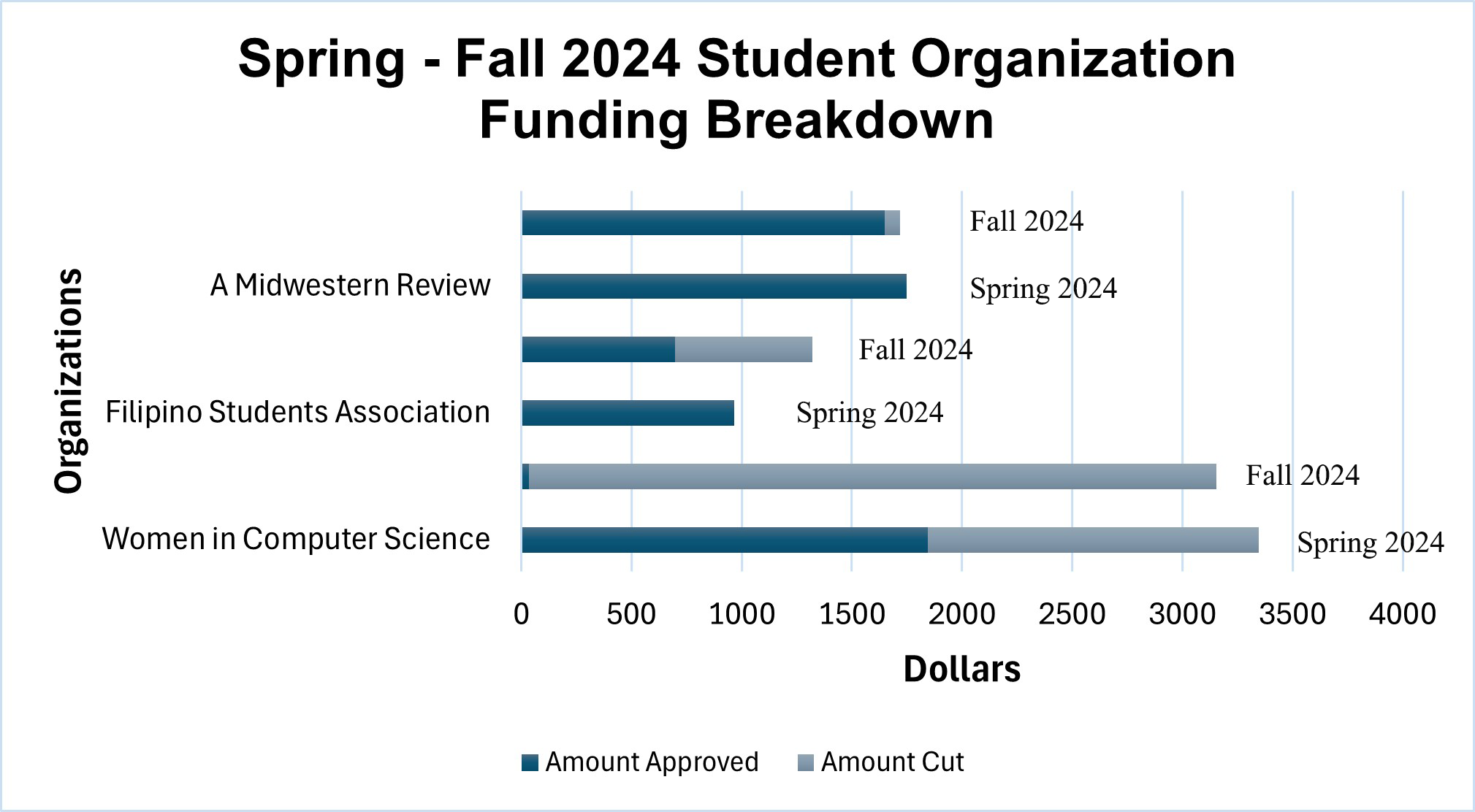
Editor's Note: Supporting graphs do not include data on every DePauw student organization. Full details on the approved funding of each organization can be found here.
After a successful spring semester with a campus-wide hackathon and professional workshops, DePauw’s Women in Computer Science (WiCS) hoped to kickstart their new lineup of fall events. Their executive board requested $3,155 from the student government for a similar semester plan – but only received $35.
“They gave us printing money for the events that they did not give us budget for,” WiCS Co-President Pushpita Saha ‘25 said.
Despite its location in rural Greencastle, DePauw University is buzzing with activity and programming from more than 100 student clubs and organizations such as WiCS. However, after the DePauw Student Government (DSG) rejected the original budget requests of over 70 organizations, student leaders feel pessimistic about their ability to execute their usual lineup of events.
Saha emphasized the ambiguity from DSG in the funding approval process. In an email sent to WiCS on Sept. 7, DSG explained that the events were rejected funding because they were classified as “priority two” events. But students were unaware of this rule prior to submitting their funding proposals.
Saha said that DSG could have clarified the open or closed nature of WiCS events with the organization, as their events are open to everyone on campus despite prioritizing women and non-binary individuals. Their club’s budgeting process involved a thorough review of past budgets and DSG allocations guidelines, which does not elaborate on the meaning of priority one and priority two events.
The unexpected financial challenge means WiCS has to reconsider some of its events, such as speaker sessions from DePauw alumni and professionals that require months of planning.
Event-by-event (EBE) meetings with the student government’s allocations board are another way that organizations can request funding for individual events. But Saha said the process would be time-consuming and unsustainable if repeated for every event.
A Midwestern Review (AMWR) Editor-in-Chief Anne Gregg ‘25 is also concerned about EBE meetings. As a student-run literary magazine, AMWR publishes at the end of every semester, celebrating with a showcase of contributors’ works. Gregg worries that by the time of their showcase, the funding remaining for EBE meetings will have run out.
In addition, new or small organizations can feel stressed and uncertain about preparing for EBE meetings. Gregg considered AMWR luckier than most because the most expensive portion of the magazine’s finances, which is the printing of the magazine itself, was approved for funding, although the food planned for their showcase was cut.
“Although I can, I shouldn’t have to eat the cost (for food),” Gregg said. DSG rejected funding for the food because of “priority two” classification, which Gregg was surprised about because the showcase has traditionally been open to everybody.
For the time being, student organizations cannot check out credit cards to buy supplies for their programming. Gregg said this adds another layer of pressure as not everyone is able to afford what can be hundreds of dollars and wait for reimbursement.
Campus Activities Coordinator Alyse Millikan sent the new credit card policy to organizations via email on Sept. 12, stating that she is working with the business office on how to keep card access available and encouraging students to seek reimbursement.
The Filipino Students Association (FSA) is another organization that got their funding proposal partially rejected for “priority two” classification. Vice President Maddie Cruz ‘27 was also unaware of the rule before submitting the proposal. The events that did not get approved for funding included the club’s karaoke night and language learning sessions, which Cruz hopes to continue as long as the organization gets funding from EBE meetings.
“It is not DSG’s fault that they did not have enough money (to fund every event), but they did not communicate their policy with us,” Cruz said.

Editor's note: This breakdown only represents data from organizations that The DePauw interviewed.
On Sept. 14, DSG made an update on Instagram about the funding distribution. One student commented on why the International Bazaar, one of the largest student-run events featuring fashion shows, performances, and food from DePauw’s international students, is considered a priority two event. DSG responded that “the event was unclear what priority it was; therefore, the board assumed it was a priority 2.”
DSG Vice President of Allocations Karan Mahato ‘25 explained that some of the priority rules are not explicitly stated in the allocations guidelines because they depend on how the allocations board, whose members change every year, interpret the funding requests. They are the main decision-makers in the funding distribution process rather than Mahato, who helped advise the board on funding availability and fairness, as well as communicating with student organizations on their behalf.
According to Mahato, the allocations board met for the first time this semester on Sept. 10 and decided that the open or closed nature of events would be one of the guiding factors in the funding distribution process.
If the board cannot determine if an event is open or closed, they place it under priority two. Although the event classification of priority two and three does not automatically lead to denied funding, the limited funding available means that only priority one events got funded at this time.
Mahato encouraged organizations to come to EBE meetings because there is still money set aside for those meetings. He said the allocations board would benefit from hearing directly from students about their programming.
Since the funding proposal process happened early in the semester, organizations are likely to change their plans later and can request more money in EBE meetings. The total funding for student organizations is divided equally between the proposal and EBE processes.
Mahato suggested that student organizations should state clearly in their funding requests if their events are open or closed, as well as include an itemized list of supplies that they plan to buy and the purchase links. They should also come prepared to “pitch” events to the allocations board in EBE meetings and can come multiple times if an event is rejected funding the first time.
Multiple factors influence the board’s decision to fund an event, including estimated attendance and whether it matches the attendance number of the same event the year before. If it does not, the board will ask how the organization plans to meet the new number. Whether funding requests are approved also depends on funding available in a particular week.
Mahato recognized that there has been a lot of frustration among student organizations. He encouraged organizations with questions over the funding distribution process to talk to him.

